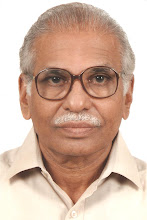While concluding Chapter VII, Sree Bhagavan had introduced a few terms such as Brahman, Adhyatma, Karma. Adhibhuta, Adhidaiva and Adhiyajna.Arjuna became eager to know the significance of these terms and asks Krishna:
Arjuna said:Krishna! What is that Brahman, and what is meant by Adhyatma, Karma, Adhibhuta and Adhidaiva.? Who is Adhiyajna and how does he dwell here in the body?Also kindly enlighten me as to how You become known to the steadfast seekers at the time of their death.(VIII-1,2)
Sree Bhgavan said: Brahman is the indestructible Supreme Self (Ultimate Reality) ; the Individual Self is known as Adhyatma and the process of bringing forth all creations is termed Karma. All perishable objects in the universe constitute what is known as Adhibhuta .That part of the Supreme Brahman ,the reflection of which shines in all bodies as Purusha(Jeevatma) is Adhidaiva. What is described as Adhiyajna is Me, indwelling in the body of everyone, as a witness to everything that happens.(VIII-3,4)
He who has his thoughts fixed in alone Me at the time of death, will undoubtedly reach Me after leaving his mortal coil. Arjuna! whatever entity on which a man's thoughts are fixed at the time of leaving his body, he having identified himself with that entity will reach that alone after death.Therefore, think of Me at all times and do your duties. Thus having your mind and intellect vested in Me, you will undoubtedly come to Me alone.(VIII-5,6,7)
Arjuna! One who, by constant practice of meditation contemplates only on the Supreme Self, without distracting his mind to anything else, will ultimately attain that superb and effulgent Divine Purusha ; That Purusha is all-knowing, older than the oldest; the ruler and supporter of the entire universe, subtler than the subtlest; his form is beyond the comprehension of human intellect, radiant like the sun and far beyond the darkness of ignorance. He, who by his devotion and power of Yoga can hold his life-breath in the space between his eye-brows and remain in contemplation with a steadfast mind at the time of his death, will verily reach that divine Purusha (VIII-8,9,10)
I shall now tell you briefly about that Supreme Goal which the seers who have learned the Vedas have termed as Indestructible, to which the striving recluses who have freed themselves from all passions enter, and desiring which are the earnest seekers practising Brahmacharya(celibacy). Having controlled all the senses, and holding the mind firmly within the heart, and then drawing the life-breath to the forehead (in between the eye-brows), and thus remaining steadfast in Yogic concentration on God, he who leaves the body and departs with the holy syllable OM on his lips, and his thoughts fixed on Me , will reach that Supreme Goal.(VIII-11,12, 13)
Whosoever contemplates on me continuously with an undivided mind , to that Yogi who always remains united with Me, I am easily attainable.Mahatmas, who have reached the highest goal by attaining Me are no longer subjected to rebirth in this transient world which is verily the abode of grief. Oh!Son of Kunti! While all the worlds right from the world of Brahma, the creator are subject the cycle of births and deaths, one who has attained Me will never have rebirth.
(VIII-14,15,16)
One Thousand Yugas constitute one day for Brahma , the creator and another One Thousand Yougas make His night.When the day for Brahma (Cosmic day) dawns, all creations come forth from His subtle body known as Avyakta (Unmanifest) and when the cosmic night begins, all creatures merge back into the same Avyakta . Thus the multitude of life creations that comes forth from time time merges back helplessly into the Unmanifest and again comes forth at the arrival of cosmic day.(VIII-17,18,19)
Even this Avyakta is not eternal. There is another Avyakta, far superior and eternal , which does not perish even when everything else in the universe is destroyed. This Avyakta is known as the Akshara( Indestructible) which is also said to be the Ultimate Goal; and that again is My Supreme Abode on attaining which there is no return to this mortal world. (VIII-20,21)
Arjuna! That Unmanifest Supreme Being known as Purusha, in whom the entire world of creation resides and by whom the entire universe is pervaded, can be attained only unstinting Devotion and nothing else.(VIII-22)
I shall now tell you about the time and path in which departed souls of Yogis either do not return or do return to this world. Yogis who cast away their body during day time when the elements of heat(fire) and light(sun ) are predominantly active, in the bright fortnight(Shukla) during which the moon is on the ascent, and the six months (Uttarayana)during which the sun is moving northwards will reach Brahman, says those who have realised Brahman.On the other hand, those who proceed to the other world during night time when the element of smoke(darkness) is predominantly active, the dark fortnight(Krishna)during which the moon is on the descent, and the six months (Dakshinayana)during which the sun is moving southwards reach the world of the celestial beings and after enjoying the fruits of their meritorious actions will invariably return to this mortal world. It has been an eternal truth that out of these two paths known as Bright and Dark (Shukla and Krishna) the followers of one of them do not return to this mortal world and the takers of the other path have to return. (VIII-23,24,25, 26,)
A Yogi who has properly understood this secret will never get deluded .Therefore, Oh! Arjuna! you must strive to be steadfast in Yoga at all times. On realizing this profound truth, a Yogi will attain the Supreme Abode of Brahman, transcending all attainments obtained by the study of Vedas, performance of sacrifices, austerities and charities.(VIII-27,28)
Thus ends the Eighth Chapter of Sreemad Bhagavad Gita, entitled Akshara Brahma Yoga( Yoga of Indestructible Brahman.)
Subscribe to:
Post Comments (Atom)



No comments:
Post a Comment